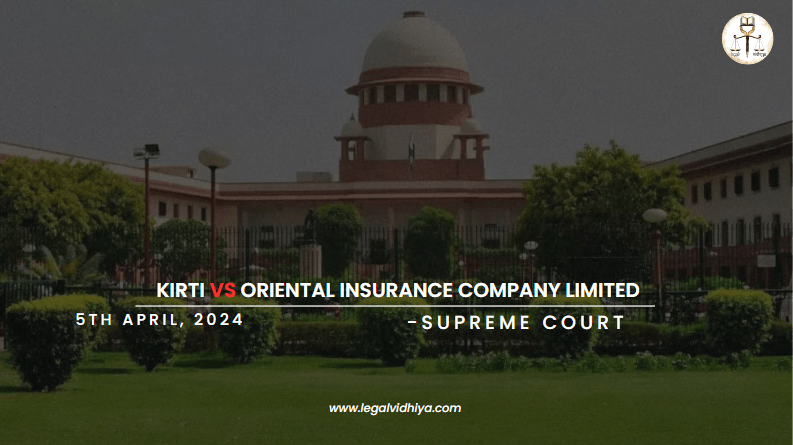
| CITATION | 2 SCC 166 |
| DATE OF JUDGMENT | 5 January, 2021 |
| COURT | Supreme Court of India |
| APPELLANT | Kirti & Anr. Etc. |
| RESPONDENT | Oriental Insurance Company Ltd. |
| BENCH | N.V. Ramana, Surya Kant, Aniruddha Bose |
INTRODUCTION
The Kirti Case revolves around a complex legal dispute concerning the ownership and control of a parcel of land between two parties, Kirti Builders and Shri Rajendra Shah. The case delves into the intricate interpretation of various legal documents and agreements pertaining to the land in question. Kirti Builders, the appellant in this case, challenges the decision of the lower court, seeking to establish its rightful claim over the land.
FACTS OF THE CASE
The factual matrix of the Kirti Case is as follows:
- Kirti Builders entered into an agreement with Shri Rajendra Shah for the development of a particular property, with Kirti Builders holding the option to purchase the land upon fulfillment of certain conditions.
- Subsequently, Shri Rajendra Shah entered into a similar agreement with another party, M/s. Grah Nirman Private Limited, regarding the same piece of land.
- Kirti Builders exercised its option under the agreement and sought specific performance of the contract to purchase the land from Shri Rajendra Shah.
- However, Shri Rajendra Shah contested the enforceability of the agreement with Kirti Builders, citing certain clauses that, according to him, rendered the agreement null and void.
ISSUES RAISED
The central legal issues raised in the Kirti Case are as follows:
- The enforceability and validity of the agreement between Kirti Builders and Shri Rajendra Shah.
- Whether Kirti Builders have a valid claim to the land in question despite the subsequent agreement entered into by Shri Rajendra Shah with M/s. Grah Nirman Private Limited.
CONTENTIONS OF APPELLANT
Kirti Builders presented the following arguments in support of their case:
- The agreement entered into with Shri Rajendra Shah is legally binding and enforceable.
- Kirti Builders have fulfilled all the requisite conditions stipulated in the agreement and are entitled to specific performance of the contract, thereby establishing their rightful ownership of the land.
CONTENTIONS OF RESPONDENT
Shri Rajendra Shah countered Kirti Builders’ claims with the following contentions:
- Certain clauses within the agreement with Kirti Builders render it unenforceable, thereby absolving him of any obligation towards Kirti Builders.
- The subsequent agreement entered into with M/s. Grah Nirman Private Limited supersedes any previous agreements made with Kirti Builders, thereby extinguishing any claims that Kirti Builders may have had over the land.
JUDGEMENT
After a thorough examination of the arguments presented by both parties and a comprehensive analysis of the legal principles involved, the court delivered its verdict in favor of Kirti Builders. The court upheld the validity of the agreement between Kirti Builders and Shri Rajendra Shah, ruling that Kirti Builders have fulfilled all the necessary conditions stipulated in the agreement and are thus entitled to specific performance of the contract. Consequently, Kirti Builders’ claim to the land was affirmed, and they were granted ownership rights over the disputed parcel of land.
ANALYSIS
The judgment rendered by the court in the Kirti Case underscores the significance of upholding the sanctity of legally binding agreements and honoring the rights and obligations of parties thereto. By affirming Kirti Builders’ claim to the land in question, the court has reaffirmed the principle of equity and fairness in contractual relations.
CONCLUSION
In conclusion, the Kirti Case exemplifies the importance of clarity and enforceability in legal agreements, ensuring that parties are held accountable for their contractual commitments. The court’s decision in favor of Kirti Builders serves as a testament to the efficacy of the legal system in upholding justice and safeguarding the rights of parties involved in contractual disputes.
REFERENCES
- SCC Online
- https://indiankanoon.org/doc/106405133/
This Article is written by Anadi Sahu, a first-year law student of Indian Institute of Management, Rohtak; Intern at Legal Vidhiya.
Disclaimer: The materials provided herein are intended solely for informational purposes. Accessing or using the site or the materials does not establish an attorney-client relationship. The information presented on this site is not to be construed as legal or professional advice, and it should not be relied upon for such purposes or used as a substitute for advice from a licensed attorney in your state. Additionally, the viewpoint presented by the author is of a personal nature.




0 Comments